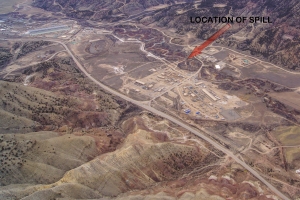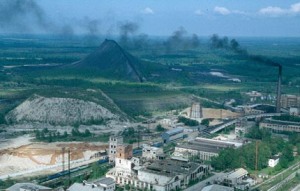
The Eagle Ford shale play has transformed the South Texas landscape since Petrohawk Energy Corp. drilled the first Eagle Ford well in 2008. The Eagle Ford was named for a small town west of Dallas where the shale is visible on the surface as clay oil, and stretches from the Mexican border to East Texas. But new applications of hydraulic fracturing and horizontal drilling have unlocked Eagle Ford shale production the South Texas region.
Oil production from the Eagle Ford shale has grown from 358 barrels of oil per day (bopd) to 338,911 bopd in 2012, and condensate production has increased from 1,423 bopd in 2009 to 72,126 bopd last year. Natural gas production also grew in the Eagle Ford from 8 million cubic feet per day (MMcf/d) to 964 MMcf/d in 2012.
The Eagle Ford's success has primarily been due to its greater productivity compared with other traditional shale plays. Oil revenues and petroleum liquids production across the play also are supporting economic development even in a time of low U.S. natural gas prices, according to a March 13 report by the Eagle Ford Shale Task Force. With 235 rigs running in the play, the Eagle Ford could potentially become the most active oil and gas play in North America, with operators forecasting exploration and production activity to continue developing in the coming decades.
The Eagle Ford boom has brought jobs and economic growth to South Texas. In 2011, the Eagle Ford supported nearly 50,000 full-time jobs in 20 counties and contributed more than $25 billion to the South Texas economy, the Eagle Ford Shale Task Force reported. Earlier this year, Wood Mackenzie reported that oil and gas companies will spend $28 billion in capital expenditures (CAPEX) this year in the Eagle Ford, and expects Eagle Ford CAPEX from 2012 to 2015 to exceed the entire $116 billion Kashagan project in Kazakhstan, the world's most expensive standalone energy project.
However, the influx of oil and gas workers to the region has also strained local infrastructure, such as roads and medical services, and raised issues such as driver safety on South Texas roads, concerns about water usage, air emissions, landowner issues and the impact of hydraulic fracturing. These challenges have highlighted the need to plan for the region's future needs, including a sustainable workforce development and a sustainable housing plan for the Eagle Ford region.
To address issues surrounding development of the Eagle Ford shale and better integrate the oil and gas industry in the South Texas region, 11 of the largest Eagle Ford shale operators have founded the South Texas Energy and Economic Roundtable (STEER), with new offices in San Antonio.
Rigzone recently interviewed Omar Garcia, who will serve as president of STEER, to learn more about the organization.

STEER President Omar Garcia Source: South Texas Energy and Economic Roundtable (STEER).
Rigzone: You have extensive experience in economic and business development in the South Texas region. Before the Eagle Ford shale, what was the business climate like in South Texas? What was the difficulty level in recruiting/retaining businesses to the area?
Garcia: During my time with the Economic Development Foundation in San Antonio and the Economic Development Corporation in Corpus Christi, business and economic growth and development were steady in the Eagle Ford region. Retention of companies wasn’t a significant challenge as the local organizations understood the potential and the benefits of the area, while recruitment numbers also remained close to national averages. However, the activity associated with the Eagle Ford Shale has propelled that growth and development to an entirely new, unprecedented level, that is booming in comparison to both the region, as it were, and most of the United States today.
That is in large part why STEER was developed -- to help support positive developments that are beneficial for the communities that have nurtured and maintained this region for decades, and to help to successfully integrate the industry into the region.
Rigzone: What do you see as the biggest challenges for South Texas and the Eagle Ford play? Obviously, getting oil and gas companies to come to the region is not an issue, but are there other businesses that need to be attracted to the region to meet the growing population?
Garcia: There are some challenges that are important to address as activity surrounding the Eagle Ford Shale continues, including the recruitment of skilled labor, availability of housing, healthcare services and infrastructure. As an organization, STEER will help to ensure those topics are addressed by encouraging dialogue, providing resources and information and acting as a conduit to bridge communities and the oil and natural gas industry.
With the growth of the Eagle Ford Shale, there is a new need in the region for the expansion and development of many novel industries to support the shale activity, which is creating tremendous economic development opportunities for local companies. Those support industries include retail, the hospitality sector, construction and, perhaps most significantly, development of medical facilities.
This ripple effect creates holistic community growth that can be sustained across various industries – an effect that is already having a hugely positive impact on the local communities who are benefiting from the new economic prospects.
Rigzone: Had there been oil and gas exploration in South Texas prior to the Eagle Ford? If so, how does this compare with the Eagle Ford shale, and how has the Eagle Ford changed the South Texas landscape?
Garcia: Historically, there has been oil and gas drilling and exploration in South Texas, but never of this magnitude. The oil and natural gas industry has become one of the most fundamental economic drivers in the region since the discovery of the Eagle Ford Shale in 2008. To put it into perspective, this shale is considered to be one of the most noteworthy oil and natural gas discoveries ever found in the state, and is currently one of the most active shale plays in the world. The Eagle Ford Shale has truly redefined South Texas, and even the domestic oil and natural gas landscape as a whole.
Rigzone: What have been some of the issues that have cropped up with the Eagle Ford shale? How has this activity impacted the local community? What about relations with the local communities and state officials?
Garcia: The challenges that South Texas faces as a result of this incredible activity relate namely to infrastructure needs and environmental considerations. Along with rapid growth and expansive development comes a need to adapt and develop infrastructure in a given area, and many communities in the region are seeing an increased need to address this growth. STEER was initiated to help recognize those challenges, and ensure that both the industry and communities are able to learn about these challenges and communicate effectively to facilitate the development of positive solutions.
In terms of environmental concerns, there is a large portion of the population, nationally, that may not understand the complexities and demands of the regulatory institutions in this region. The oil and natural gas industry is one of the most heavily regulated industries in the country, and is subject to federal, state and local regulations that oversee all aspects of the industry, from initial permitting to wastewater disposal.
STEER is connecting the oil and natural gas industry with local officials, regulatory bodies, legislature and South Texas Communities to help bridge any gaps in communication or understanding surrounding the Eagle Ford Shale in the region.
Rigzone: What has prompted the decision to establish this group now? Have other groups been established/attempted? Do you anticipate companies besides the 11 initially involved to join anytime soon?
Garcia: STEER was established by 11 of the largest operators in the Eagle Ford Shale region including: Anadarko, Chesapeake Energy Corporation, ConocoPhillips, EOG Resources, Lewis Energy Group, Marathon Oil, Murphy Oil, Pioneer Natural Resources, Shell, Statoil and Talisman Energy.
The operators saw a need in South Texas to maintain a cohesive and collaborative stakeholder relations effort throughout the Eagle Ford Shale and developed STEER to lead that initiative.
There are truly no other groups like STEER; we are the first regional oil and natural gas trade association that is specifically focused on South Texas.
STEER does have an established membership program we do anticipate other organizations becoming involved with STEER in the future and growing our membership base.
Rigzone: What kind of communication pathways were being used by oil and gas companies to state officials and local communities? Why do you think these were not effective?
Garcia: Prior to the development of STEER, the individual member companies did a great job communicating with officials, communities, academia and beyond. STEER was founded to be an interconnected and collective resource for the region as related to the Eagle Ford shale. The purpose of STEER is to serve as channel for both intra-organizational communication, to ensure that operators are sharing information and resources with one another for the betterment and enhancement of the communities and the industry, and also to be a resource for external communication – to be the recipient and facilitator for questions, inquiries and information.
Rigzone: What kind of strategies will you employ to address the challenges of infrastructure?
Garcia: STEER is committed to staying informed and educated about all challenges and issues as they relate to the Eagle Ford Shale, including infrastructure. With that, we will continue to act as a resource to help the industry and the communities to understand these challenges in order to make positive solutions for the region. STEER’s purpose is to gather and share resources and information in order to help inform stakeholders about challenges.
Rigzone: Some international companies have acquired interests in the Eagle Ford shale. What kind of challenges come with having international companies in the region?
Garcia: We welcome the international investment and attention that the Eagle Ford Shale has helped bring to Texas. These companies are working toward developing a comprehensive understanding of the region and the industry, and STEER is here to help serve as the conduit between these companies, industry and the communities of South Texas.
Karen Boman has more than 10 years of experience covering the upstream oil and gas sector. Email Karen at kboman@rigzone.com.
Generated by readers, the comments included herein do not reflect the views and opinions of Rigzone. All comments are subject to editorial review. Off-topic, inappropriate or insulting comments will be removed.
View the original article here




 Generated by readers, the comments included herein do not reflect the views and opinions of Rigzone. All comments are subject to editorial review. Off-topic, inappropriate or insulting comments will be removed.
Generated by readers, the comments included herein do not reflect the views and opinions of Rigzone. All comments are subject to editorial review. Off-topic, inappropriate or insulting comments will be removed.  Site of Parachute spill
Site of Parachute spill
 STEER President Omar Garcia Source: South Texas Energy and Economic Roundtable (STEER).
STEER President Omar Garcia Source: South Texas Energy and Economic Roundtable (STEER). Arial photo of a pile of oil shale ‘ash’ in Estonia. Source: EcoCrete Project.
Arial photo of a pile of oil shale ‘ash’ in Estonia. Source: EcoCrete Project.
 Maine’s renewable energy standards have been the prime target of the Koch Machine – front groups, think tanks, and legislators with financial ties to Koch Industries and its two billionaire owners: the Koch brothers.
Maine’s renewable energy standards have been the prime target of the Koch Machine – front groups, think tanks, and legislators with financial ties to Koch Industries and its two billionaire owners: the Koch brothers.